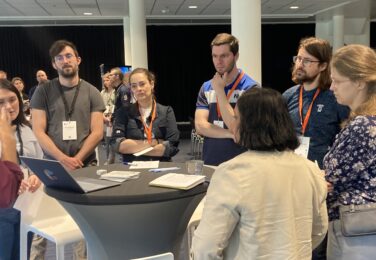DCC SPRING TRAINING DAYS 2024

Registration
The program
Session 1 (Thursday April 11, 12.30-16.00) Engaging researchers with data management plans
by Esther Plomp, TU Delft and Lena Karvovskaya VU Amsterdam
This workshop aimed at starting research support staff who are beginners or have intermediate knowledge regarding data management plans (DMPs). The goal is to equip participants with the skills to effectively engage researchers in discussions about research data management using DMPs. DMPs can be particularly helpful to discuss ways of workings in research labs or in larger projects, as they are an opportunity to align different ways of working and to document these in the DMP. You will engage in smaller group discussions on how to approach these DMP engagements, focused on the discipline you’re supporting (where possible - subjectable to sign-ups). At the end of the workshop you will be able to use the DMP as a tool to engage researchers in discussions about research data management and to facilitate them to optimise group workflows and align different ways of working within research projects. We will discuss various engagement strategies to meet researchers “where they are” in their workflow and help researchers see research data management as a part of their research process.
Session 2 (Thursday April 25, 09.30-13.00) Reproducible Workflow
by Renate Mattiszik, Saxion University of Applied Sciences; Stephanie van de Sandt and Meron Vermaas, VU Amsterdam
This workshop will teach best practices on how to organize a research project throughout its life cycle using familiar tools as much as possible. In interactive breakout sessions participants will gain hands-on experience in creating, organizing, updating, and archiving research projects. At the end of the workshop you will have gained your first experiences with creating project changelogs, versioned project releases, and publishing research on research data repositories like Zenodo.
Session 3 (Thursday 16th of May, 12.30-16.00) The role of good RDM in accelerating scientific progress
by Kristina Hettne, Digital Scholarship Librarian, Leiden University Library; and Alessa Gambardella Data Steward Science, Leiden University
For researchers and support staff, intermediate level. In this workshop we will introduce methods and tools to implement the FAIR data principles for good data management and discuss how they accelerate scientific progress. We will introduce different FAIRification frameworks and some examples of where they are currently used (funders, projects). As an example, we will guide you through a FAIR Implementation Profile (FIP) and show you what are being taught in a Metadata 4 Machine workshop (M4M). At the end of the session, you will know more about how to practically implement FAIR data in a project.
Session 4 (Thursday 23rd of May, 09.30-13.00) Basic Principles of Linked Open Data & SPARQL
by Kristina Hettne, Digital Scholarship Librarian, Leiden University Library; and Eva Lekkerkerker, Library of the UvA Board and Staff UB
This workshop is aimed at researchers and research support staff. No prior knowledge or experience is required. With Linked Open Data (LOD), data is offered in such a way that it is much easier and automatic to connect to other data. This makes the data richer and more useful to the user. This hands-on tutorial introduces the basic principles of LOD, how to create and publish LOD and how to query it using the query language SPARQL. The focus example will be cultural heritage data, but the basic principles are applicable to all type of data modeled as LOD. At the end of this session, you will know the basics about how to create and work with LOD. Learning goals: Understanding the basic principles of LOD, Creating LOD, Publishing LOD, Introduction to query language SPARQLPractical information: bring your laptop and charge
Session 5 (Thursday 23rd of May, 12.30-16.00) Making qualitative data reusable (includes lunch)
by Ricarda Braukmann & Maaike Verburg (DANS)
For Researchers & Research support staff, focused on beginners to the topic. At the end of this workshop, you will be able to evaluate and improve the reusability of qualitative data at all stages of the research data life cycle. You will have a rich toolbelt to your disposal when facing the challenges you may encounter when working with qualitative data. How do you specify an informed consent form that allows reuse? What access level should you select for the data? Which file formats facilitate reuse? How do I choose de-identification techniques to best balance reusability and data loss? How can researchers and data support staff work together at all different stages to foster the best reusability possible? You will be familiar with useful tools and examples and be able to discuss and evaluate the complexities of qualitative data in practice. The main focus of this workshop will be on interview data. Do you have a project or qualitative dataset that you have worked with? Make sure you bring it along with you!
Session 6 (Thursday 13th of June, 09.30-13.00) Practical Pedagogical Techniques for hands-on workshops at Witte Vosch
by Lieke de Boer, Community Manager, the Netherlands eScience Center; Fenne Riemslagh, Coordinator Training Programme, the Netherlands eScience Center;
In this workshop, we will teach you a few pedagogical techniques that will help you improve your training sessions. We will be teaching you, and you will be teaching each other about formative assessment, the use of inclusive language and engaging discourse. At the end of this training, you will know how to implement peer instruction, monitor student learning, use simple language and avoid jargon, and use analogies, personal stories, and/or humor to make content stick.
Session 7 (Thursday 13th of June, 12.30-16.00) Collaborative Lesson Development with Github at Witte Vosch , includes lunch,
by Sven van der Burg, (Trainer & Lesson developer @ Netherlands eScience Center)
Lesson development is easier and more successful when it is a joint effort among collaborators, but how do you organize this? In this workshop you will learn how you can use GitHub as a central place for storing your lesson material and how you can best organize collaboration using GitHub. At the end of this workshop, you will be able to effectively use GitHub for the lessons you develop. This workshop is intended for researchers and research support staff and doing lesson development. Prior experience with Git or GitHub is useful, but not mandatory.
Session 8 (Wednesday September 11th 09:30-12:30) Anonymization and Pseudonymization introduction
by Hanne Vlietinck (Technical Data Steward with background in IT, Hasselt University, Belgium); Afshin Amighi (Lecturer and researcher in Rotterdam University of Applied Science)
This interactive workshop is an introduction of basic techniques and tools for protecting (personal) sensitive data. In the first part, the differences between fully-identifiable data, anonymous and pseudonymised data will be explained. Subjects like techniques, tools and the protection model (K-anonymity, L-diversity, T-closeness) will be handled. You will also get the opportunity to try-out these de-identification techniques in hands-on exercises. In the second part we will handle different levels of access control (authentication and authorization) and best practices on passwords. Possible tools for encryption will be discussed. This part will also be followed by hands-on exercises, during which you consider what measurements you have already taken and what can be improve.
Session 9 (Wednesday september 11th 13:00-16:00) , Anonymization and Pseudonymization
ADVANCED (be aware , if you follow the introduction course this afternoon is likely too advanced for you)
by Mortaza Shoae Bargh and Afshin Amighi (Lecturers and researchers at Rotterdam University of Applied Science)
For researcher support staff and researchers. Legitimacy of data-driven research and success of data-intensive applications like machine learning and other AI techniques depend heavily on protecting privacy in the design, realization, deployment and maintenance of these studies and systems. Therefore it's important to apply some measures on the data to reduce the risk of disclosing sensitive information as much as possible. In this course we focus on the techniques in Statistical disclosure control to minimize the amount of personal data in data sets.
Registration
Research Software Training NL Day 2026
For software trainers, training coordinators, DCC coordinators and other software training enthusiasts. We are pleased to announce that the programme for the first annual Research Software Training NL (RST-NL) Day on 5 march 2026 is finalised. This event brings together professionals from across the Netherlands who are involved in research software training. Join us for […]

National onboarding day
An onboarding event for those who are involved in Research Software training and support and for those involved in Interoperability Management. The program is a mix of talks, speed-dating and other interactive sessions. The talks will cover the national and international landscape.

